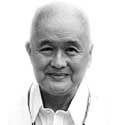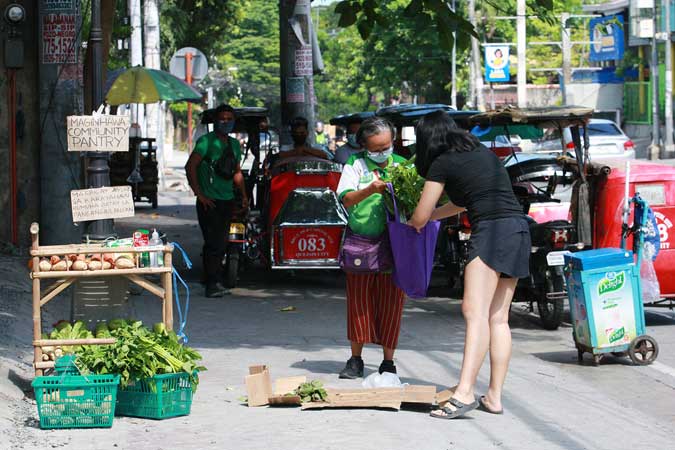
Musings
By Oscar P. Lagman, Jr.

On April 14, Ana Patricia Non brought out of her house on Maginhawa St., Quezon City a cart filled with fresh vegetables, canned goods, eggs, and non-food items. On the cart was a piece of cardboard oh which was written “Maginhawa Community Pantry. Magbigay ayon sa kakayahan, kumuha batay sa pangangailangan” (Give what you can, take what you need).
That day, several passersby, attracted by the food cart and the message on the piece of cardboard, stopped by. Urged by Patricia, they picked up a few items and walked on. Word got around the neighborhood such that in the days following, hundreds came to take from the “pantry,” which was starting to look more and more like a neighborhood market as it expanded from a cart to a long row of makeshift stands behind which were Patricia’s growing number of volunteer helpers.
The Maginhawa Community Pantry inspired other communities to put up their own pantries. Community pantries mushroomed all over Metro Manila. There are now community pantries in the Visayas and Mindanao and even in faraway Timor Leste.
The word “epidemic” is generally taken to mean the rapid spread of disease to a large number of people in a community or region within a period of time. The word originally meant something affecting a disproportionately large number of individuals within a population, community, or region at the same time. So it is right to say that the rapid replication of the Maginhawa Community Pantry is an epidemic.
Like the coronavirus, the Maginhawa virus has also mutated. There is now the Bugallon, Pangasinan variant — a combination pantry/medicine cabinet on a bicycle. There is the Iligan City variant, halal pantry.
Malcolm Gladwell wrote in his book The Tipping Point that the confluence of three factors starts the epidemic of an idea: the personality of the person who came up with the idea, the novelty of the idea, and the relevance of the idea to the general population.
Patricia may not be in the same class as other well-known civic leaders. She does not have the stature of Dr. Vicky Belo whose name is synonymous with aesthetic surgery. Dr. Belo, whose patients are mostly showbiz celebrities and ritzy matrons, renders her service for free to poor individuals with cleft lips and palates. She recently volunteered her services to the government’s
vaccination program.
Patricia is far from being as popular as the actress Angel Locsin, an acknowledged philanthropist and a known human rights advocate. But she is notable enough in her community. She is known to be sincere, capable, and dedicated to whatever endeavor she undertakes. The 26-year-old UP College of Fine Arts graduate has given free art workshops to poor young people and to political prisoners.
The community pantry idea is a translation into action of the bayanihan spirit, which is a trait of the Filipino to help others in need without expecting any reward. That spirit has been translated in many ways many times in many parts of the country. In the olden times, when houses in the countryside were made of light materials, bayanihan meant helping the homeowner relocate his house. In contemporary times, bayanihan is demonstrated many times when private individuals supply health workers with personal protective equipment and send them food.
Still, the community pantry is a novel translation of that spirit. Patricia could have simply distributed food packs, or she could have written on the cardboard on her food cart, “Libreng gulay, de lata, at iba pa” (Free vegetables, canned goods, and other items).
But one whoever avails herself of the free items leaves feeling she left behind her dignity. The “community pantry” somewhat mitigates that feeling. One who takes something from the community pantry is presumed to place something else. Also, the shareholder of the pantry is free to choose what food she will provide her family instead of getting a ready-to-eat meal in a box from a fast-food chain. That is the novelty of the Maginhawa Community Pantry, that is why the idea spread like the coronavirus.
Community pantries serve thousands of hungry jobless individuals. It is estimated that four million Filipinos remain unemployed because of the lockdown imposed to contain the spread of COVID-19. The community pantry was put up as a collective action to alleviate widespread hunger, Patricia said. She added that one of the possible reasons why the project trended online is because a lot of Filipinos could relate to the idea.
Agents of the Duterte Administration have branded community pantries as disguised platforms for communist propaganda. Lt. Gen. Antonio Parlade, spokesman of the National Task Force to End Local Communist Armed Conflict (NTF-ELCAC), which is under the direct command of President Duterte, accused the people behind the Maginhawa Community Pantry as being funded by communists. Former communist cadre Shane Valdez even told the Philippine News Agency that Patricia was a member of a communist terrorist group. She claimed Patricia has a hidden agenda which that is why she didn’t use “Bayanihan” for the name of her pantry. What wild communist logic!
Neither Gen. Parlade nor Shane Valdez presented any evidence to substantiate their allegations. Gen. Parlade, who is chief of the Armed Forces of the Philippines Southern Luzon Command, can send operatives of the Intelligence unit of that Command to Maginhawa to pretend to be volunteers and pantry shareholders to gather evidence that can expose Patricia’s supposed communist financial backers and her hidden agenda. The Maginhawa Community Pantry has been in full operation for almost two weeks now, yet Gen. Parlade has not come up with any evidence that would prove his claim.
That is why civil society groups have been led to believe that Gen. Parlade’s baseless accusation is really a disguised attempt to put an end to the community pantry epidemic because it is causing extreme embarrassment to the Duterte Administration.
Community pantries fill the gaps in the way the Duterte Administration is addressing the problems of unemployment and hunger. Little to no financial assistance has been given to the country’s poor who have been struggling to stay alive all throughout this protracted lockdown. As Senator Francis Pangilinan said, the community project serves as a sad reminder that people can only rely on each other in times of need. Senator Richard Gordon remarked that the government is put to shame because private citizens are doing what it should be doing.
The COVID-19 epidemic has shown the government to be incompetent. The Community Pantry epidemic is showing it to be inutile.
Oscar P. Lagman, Jr. is a retired corporate executive, business consultant, and management professor. He has been a politicized citizen since his college days in the late 1950s.